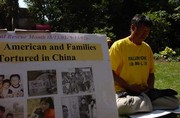September 12, 2003
|
Members of Falun Gong, a Chinese spiritual philosophy banned by the country's government, seek [support] |
Meng Jun. Yue Yao. Yanhong Dong.
These are just three of thousands on a list of individuals currently imprisoned by the Chinese government for their [belief in] Falun Gong [...].
Practitioners of the belief system, among them one former Chinese labor camp prisoner, made a visit to Penn's campus yesterday with the goal of generating enough support to remove one name from that growing list -- Charles Li.
"It's a human rights issue, and what's going on in China is definitely something people should be aware of, and take action," said Falun Gong member Qing-Qing Qiu, describing the philosophy as a collection of meditations and exercises that emphasize certain moral principles, such as "compassion and tolerance."
Li, a physician and an American citizen who was traveling to China to visit his relatives, was detained by Chinese officials at Guangzhou Airport in January and sentenced to a three-year prison term because of his affiliation with Falun Gong.
In recent weeks, his story has drawn a wave of support from practitioners across the country, who -- through a series of signature drives that began in California -- are hoping to rally enough support to convince the U.S. government to take action on Li's behalf.
[...]
China's leaders have faced extensive criticism for its treatment of Falun Gong practitioners -- a 2002 Human Rights Report released by the U.S. Congress earlier this year notes that "several hundred Falun Gong adherents reportedly have died in detention due to torture, abuse and neglect" since the Chinese government outlawed and [began persecuting] it in 1999. Former Chinese President Jiang Zemin also faces charges of genocide in a U.S. court for his role in the persecution.
Gang Chen, a Falun Gong practitioner and one of yesterday's signature drive organizers, came to the United States just a month ago after spending 18 months at Tuanhe, a Chinese labor camp, where he said he was "tortured day in and day out, mentally and physically."
"I know what Dr. Charles Li is going through now," he said.
Born in Beijing, Chen was identified by the Chinese government as a follower of Falun Gong after practicing meditation exercises with a group of several hundred practitioners in a public park, and placed under house arrest. It was when he attempted to appeal this decision that he was detained several times in 1999 and 2000, and eventually sent to Tuanhe for what he called his "darkest days."
There, he said, he endured torture that included being shocked and subjected to beatings.
"When they shocked you with the electric baton, it felt as if [you were] being bitten by a hundred snakes or set on fire," he said. "They pushed us to the extreme both mentally and physically.... Forget about human rights."
Now in America, Chen stressed the need to inform others about the situation in China -- including students.
"Here we can say and do anything that we believe in," he said. In China, "they just do not listen to people's voice... it feels like another world."
Qing Yang, an engineer who fled from China in August of 2000 and now lives in Chicago and has practiced Falun Gong for eight years, echoed Chen.
Speaking through a translator, he explained that since his arrival in the U.S., he has spent a portion of every day protesting outside of the Chinese Embassy in Chicago.
He expressed hope for the cause, citing examples of "rescues" of prisoners that have resulted from efforts in Canada and Australia. And while American response and interest may not be overwhelming yet, he anticipates it will grow.
Jessica Dean, a psychologist and Philadelphia resident who has practiced Falun Gong for over a year as a means to improve her health, echoed their enthusiasm.
"I'm fairly confident, because in other countries, it's worked," Dean said.
[...]
http://www.dailypennsylvanian.com/vnews/display.v/ART/2003/09/12/3f618d341b082
Category: Falun Dafa in the Media






